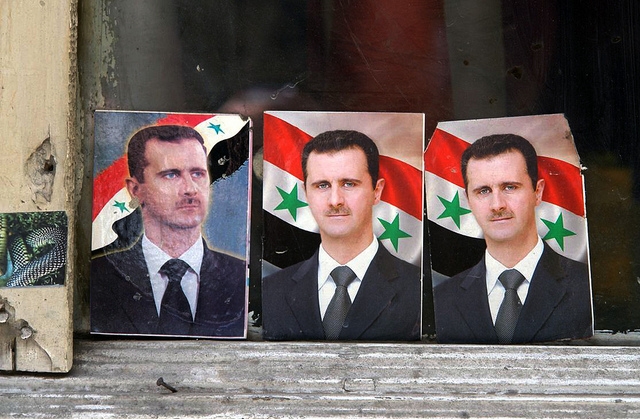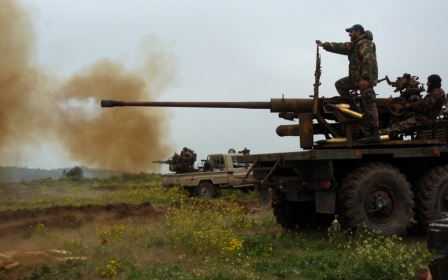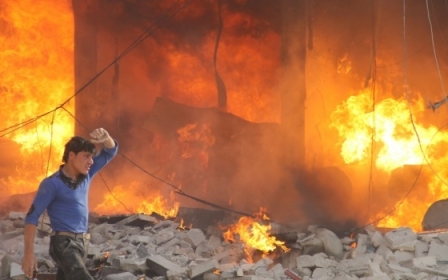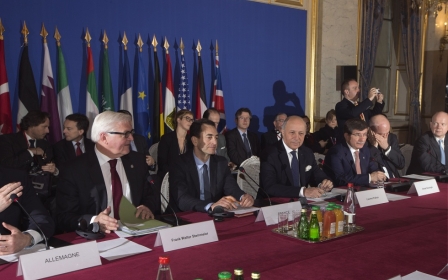Syria opposition powerless as election nears

by Serene Assir
BEIRUT - Syria's divided rebels and their foreign backers have been watching in disbelief as the regime gears up for an election to give Bashar al-Assad another presidential mandate despite their uprising.
The vote, which the Damascus regime can hold only in territory it controls and embassies abroad, signals confidence by Assad and his allies that they will win the war.
"Two years ago, we used to think it was impossible the regime would last long enough to hold the 2014 election. I just can't believe it's going to happen," sighed Thaer, an activist from Homs city, once known as "the capital of the revolution".
"When the revolution began, we were much stronger, the movement was peaceful and massive, and our hopes were high," he told AFP via the Internet.
New MEE newsletter: Jerusalem Dispatch
Sign up to get the latest insights and analysis on Israel-Palestine, alongside Turkey Unpacked and other MEE newsletters
Now, he says, the election is a new signal that Syria's revolt has escalated into a proxy war, "in which the Syrian people are paying the highest price."
A rebel commander in Damascus province agreed.
He said the reason the regime is able to hold its vote is because of the opposition's endemic division, a lack of leadership, and a failure by the international community to make good its promises to the revolt.
'Factionalism burdens the revolution'
"The international community is not merely paralysed... The truth is it doesn't actually want to help," said Selim Hejazi, echoing the opposition's belief that while Assad has all the help he needs, the so-called Friends of Syria who back the revolt have been more self-interested.
Hejazi also cited "the continuous disorganisation and factionalism among the ranks of the armed opposition (as) burdens to the revolution."
While Assad's regular army has received huge amounts of military, financial and economic assistance from Russia and Iran, support for the rebels from their backers in Qatar, Saudi Arabia, Turkey and the West has been at best chaotic.
Even though the opposition has seized significant swathes of territory across the country, the regime still massively outguns the rebels with its regular army, air force, growing paramilitary force and elite fighters from Lebanon's Shiite Hezbollah.
Syria's revolt broke out in March 2011 as an Arab Spring-inspired, non-violent movement demanding political change.
It later morphed into a nationwide Islamist insurgency that in time has grown increasingly radical and violent, after Assad's regime unleashed a massive crackdown against dissent.
The West, especially the United States, has so far held back from providing much military assistance, citing fears that weapons would land in the hands of jihadists.
'No political solution'
According to Samir Nashar, a veteran anti-Assad dissident and member of the main opposition National Coalition, the West's fears have kept the opposition weak.
"The West, especially the United States, seem to focus on managing the Syrian conflict -- not on effectively supporting the opposition," Nashar told AFP by phone from Turkey.
Syria expert Noah Bonsey, who works with the International Crisis Group, agreed.
"Western allies have offered words that raise rebel expectations, but the limited material support they provide is insufficient to effectively empower the moderate elements they ostensibly back," Bonsey said.
Meanwhile, support for the regime from its allies has come in the form of financing, weaponry and political clout.
On the ground, the regime has scored a string of advances in recent months, steadily raising the heat as election day edges closer.
In the past few weeks, it has reclaimed the Old City of Homs and broken the rebel siege of Aleppo central prison.
Opponents see the advances as part of Assad's electoral campaign, and a stark indicator that "there is absolutely no political solution in sight. The regime is saying loud and clear it wants to win militarily."
Middle East Eye delivers independent and unrivalled coverage and analysis of the Middle East, North Africa and beyond. To learn more about republishing this content and the associated fees, please fill out this form. More about MEE can be found here.




